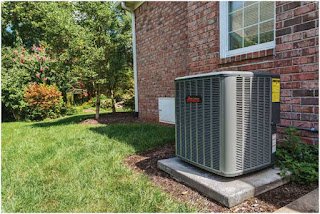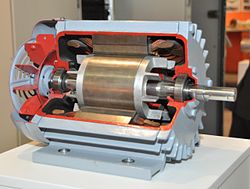HVAC systems: The most important things you need to know about them
Systems like HVAC can help in Heating, Ventilating, and Air Conditioning. And yes, that’s where the name comes from! These systems (such as air compressors) are great for occupied indoor areas and can help in thermal control for any desired space. In this article I want to talk a bit more about these systems and help you get a better understanding about their functionality, component, maintenance, etc. and will introduce a few useful resources for further reading on each subject. Are you ready? Then keep on reading.
How to maximize
your HVAC’s efficiency
Each and every
system wears out over time and these systems are not an exception. But here I
will tell you how to get the most out of your system and also the ways to
increase their lifetime!
It’s not a
secret that all systems need regular maintenance to keep working the way
they’re supposed to. But some people just don’t know how much the right
maintenance can affect efficiency and just do some basic steps and checkups on
the system. Keep in mind that the HVAC system contains multiple electrical and
mechanical components and various connectors to keep them connected. Each and
every one of them need maintenance to work the way it should and save you time
and energy in the long run. Now, let’s get to the real question:
What are the
things you need to consider for HVAC maintenance?
One of the most
important things to keep an eye on is the filters (like air filters) used in
the system. These filters should be cleaned constantly and replaced at the
right time to provide the best performance in the system. Debris and dust in
the filters and other parts like blowers should be cleaned and removed from the
units since in the long run, they decrease efficiency, lower the air quality,
and might as well broke the system completely.
You need to
constantly lubricate the moving parts as well. Proper lubrication can prevent
excessive heating and keeps them in good shape to work effortlessly.
Another thing
to consider in HVAC maintenance is the voltage of electrical components and
their electrical connections. If they are not at the right voltage, they can
compromise the whole system and you’ll end up spending a lot of money that
could’ve been easily avoided at the maintenance stage.
Regular
maintenance and calibration of the system are important too. Check to see that
the actual outcome matches the reported numbers. Depending on the corresponding
part of your system, you might need annual, seasonal, or monthly maintenance to
repair the system, inspect different parts for damage and leakage, lubrication,
cleaning the system and the filters and so on. If you want to maximize the
efficiency, it’s better to set checkups monthly for cleaning and inspection to make
sure every part works well.
If you don’t know the components well enough
to know which ones need monthly checkups and which ones can wait for a seasonal
or annual one, then continue reading to learn different components. Otherwise,
for a more detailed checklist for HVAC maintenance, check out this article that contains many useful tips and tricks to minimize the
maintenance cost as well as different things you should consider for the next
maintenance appointment.
Different HVAC
system components
So, let’s
review some of the major components of these systems.
-
Heat
generator
As the name
suggests, heat generators produce heat for the air or other fluids directly or
indirectly. The most common form of heat generators is furnaces. So consider
combustion efficiency for resource control and pollutant emission.
-
Heat
exchanger
The heat
exchanger is the unit that takes the heat provided by the heat generator and
transfers it to the fluid or directly to the cool air.
-
Thermostat
One of the key
elements in HVAC systems is the thermostat that includes a temperature sensor
to decide when the right time to turn on or off the air conditioner is. Making
sure that it works properly is of importance since it can save up money by
eliminating the overuse of the system.
-
Air
ducts and vents
Ducts enable
the transfer of the air throughout different components of the system. Check
for leakage in its maintenance to make sure there won’t be any noise when the
system’s running and eliminate odors or excess moisture entering into the air.
-
Blower
The blower is
the component that blows the air through the heat exchanger into the air ducts.
So to make sure the right amount of air is transferred in the system, check out
the blower and keep it in good shape.
-
Condenser
coil / Compressor
This unit
removes the heat from the warm refrigerant gas and takes the heat to the
outside environment and turn the gas into its liquid form. Then the evaporator
coil will continue the necessary tasks on the liquid refrigerant.
-
Evaporator
coil
As I already mentioned,
the condensed refrigerant liquid runs into the compressor and is atomized by
the nozzles to increase the rate of refrigerant evaporation. The warm air with
the help of fans, and goes into the evaporator and its heat will be transferred
into the atomized refrigerant. Then the air that’s now cool goes back into the
room with the help of ducting.
These were the
most important parts, but if you want to read more on the subject, check out this
article and learn some great details about them.
Aside from the
right maintenance, there’s one more thing that can help increase the efficiency
of your system and lower the costs of maintenance: HVAC Economizer!
This economizer
can help enhance the economy of your system. This part goes on the exterior
parts of the system and evaluates the humidity and the temperature of the air
outside to decrease or cut the workload on the air conditioner by using the air
outside to cool down the building.
These
economizers have different types that are based on the requirements of the
system such as dry-bulb.
Economizers
have many benefits such as saving you money by reducing the time that the
system should work and as a result, you’ll pay a lot less for the electric
bill. It can also increase the level of ventilation by monitoring the outside
air with the inside and using the outside air whenever possible.
So make sure
you check if your HVAC system has an economizer and get one if your system
doesn’t have it to reduce costs and increase the efficiency. You can learn more
about these economizers here.
Now that you
know how to get the most out of your system, you can easily maintain yours and
also use the tips and tricks you learned to keep your system in good shape.
These systems can be used for industrial, commercial and residential purposes
and can keep the air at the desired level to create a comfortable place for
you, your family, your employees, etc. Plus, it increases the quality of the
air you’re breathing that directly affects your health! So why not using an
HVAC system to have a healthier life? If you are interested to receive more
information about these systems, click here.
There you have
it! Some of the most important things and tips to know about HVAC systems and
their efficiency! Care to share your thoughts and experiences on the subject?
Drop us a comment below and let us know what you think.
**
Sources:
https://www.linquip.com/blog/hvac-maintenance/
https://www.linquip.com/blog/hvac-system-components/
https://www.linquip.com/blog/hvac-economizer/



Comments
Post a Comment